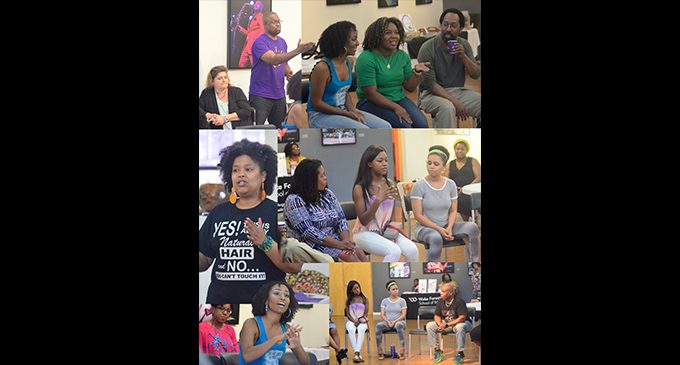Local event sparks conversation on colorism

What does colorism mean to you? Do you have light skin or dark skin privilege? How has colorism impacted opportunities or lack thereof? Those were just a few of the questions raised at the Delta Fine Arts Center during the Collard Greens & Salsa Collective’s open conversation on colorism and its impact on today’s culture.
Although the term colorism was coined by Pulitzer Prize winner Alice Walker in 1982, the practice of showing prejudice or discrimination against an individual based on their skin tone is rooted in slavery. History shows us that slave owners gave preferential treatment to slaves who had lighter skin tones. While dark-skinned slaves worked long hours in the sweltering heat, light-skinned slaves worked indoors.
The division between the two groups created a barrier between light and dark African Americans that still exists today. While a lot has changed since the first slave ships docked on the coast of Virginia, colorism, just like racism, is something that we are still fighting against. And the event hosted by the Collard Greens & Salsa Collective gave people from all walks of life an opportunity to share their feelings on the topic.
To jumpstart the event, participants were encouraged to use a few yoga stretches to relax their body and minds. Salem College Associate Professor of Sociology and Criminal Justice Dr. Kimya Dennis started the conversation by asking the group to define colorism in their own words. That question led to a larger conversation that touched on a number of topics including discrimination in the workplace and school, hair texture and style, the election of the first African American president, and of course, discrimination among people of color.
When discussing the event, Betishia McIntyre-Williams said having open conversations is a way the African American community can come together and bring an end to forms of colorism and discrimination.
“I think conversations like this is a start, that is why I’m here. My entire life I heard I was pretty to be dark. And when I went natural, that became an issue as well,” said McIntyre-Williams, “… so I think having these open, honest conversation among us is a step in the right direction.”
The Collard Greens & Salsa Collective is a group of black and brown women coming together in unison to talk to, learn from, and figure out ways to engage Winston-Salem’s African American and Afro-Latino community. Gumbo: A Conversation on Colorism is just the first of many important conversations the collective will be having throughout the year.
For more information, visit Collard Greens & Salsa Collective on Facebook. The group can also be reached by email at collardgreesnsalsacollective@gmail.com.











